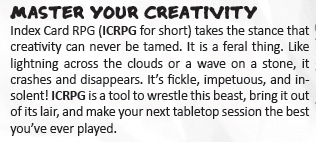Hey there, I had originally planned a longer, more bloviating post but I figured keeping it simple would be better. I started a campaign and in trying to explain the rules and ethos to players I realized that I was still a little on the fence about the whole "ICRPG is a skeleton/DIY framework/“You’re the GM, you decide” aspect of how the RPG is sometimes presented. (those are sentiments I’ve seen a fair amount in response to specific rule questions online)
I’m using Master Edition, and it states:
How to use the ICRPG rules? Short answer: don’t. Index Card RPG is a way of thinking. Your players invested in another system? No problem. The mindset is what will supercharge your GM style, not some specific rule or system written on a dead tree. Take what is useful for you, and toss the rest! This book represents countless hours of gameplay and GM feedback, all condensed into a resource to bring more ICRPG players to the table. It’s just an intro! Just the latest mod in a hobby of mods!
Cool! Now, I will be 100% honest that when I first read through that I kind of skated over it, as I thought it was just a poetic way of getting across that the spirit of the RPG is to be creative and not get hung up on rules. After some reading comprehension I understand what the point is now. Still curious, I asked a friend who is using 2e if this was in there, and here is what she quoted to me:
This is a full blown, world-built, battle-tested, wall-to-wall RPG for your tabletop! If you’re new to tabletop gaming, you’ve chosen a great place to start. If you’re an old vet, set aside all the old cruft and open the beginner’s mind…the little mind…let’s just sit down and have some fun
The two approaches seem pretty night and day to me so I wonder if anyone could explain how ICRPG went from “here are all the rules, start playing” to “you should be an experienced DM ready to hack and build the game”. Was there an intentional transition to this design, or did the editions just catch up to how the community was doing things?
I realize that bloviating still happened. My apologies, it could have been a lot worse. 

